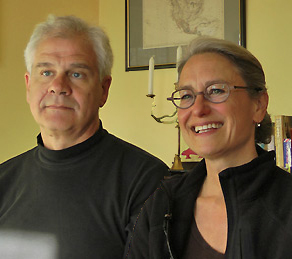Lilian & Michael

Care for their son
Age at interview: 55
Age at start of caregiving: 37
Lillian and Michael are married and in their mid-50s with two children. Their younger son, Oliver, has several disabilities and has just turned 18 years old. Lillian and Michael both work full-time: Lillian as a consultant who travels frequently, and Michael as a professor at a university. They are worried about their son’s future and care arrangements as he transitions into adulthood. Oliver was born with severe problems (hemiparesis, seizure disorder, cerebral palsy, visual impairment) due to a lack of oxygen in utero. He lives at home with them and requires 24/7 care. They have established a variety of care arrangements for their son via volunteer and paid help, beyond the daytime public educational and social programs available for children with disabilities. These programs will no longer be available to them now that Oliver is considered an adult.
Oliver was born with multiple, severe disabilities and spent the first several weeks of his life in hospital. At times, Lillian and Michael were not sure if he would survive, and they were upset that many of the decisions regarding his care in the perinatal hospital were made without their involvement. His early years were characterized by many seizures, which were difficult for his parents to cope with at home, and he went through several different types of treatments. As a young adult, Oliver can walk but is unstable and falls frequently; he does not speak but makes sounds and some gestures to communicate; he has a serious visual impairment; and, has limited cognitive ability – yet, medically, he is relatively stable, and trips to the hospital and doctors are increasingly infrequent. The most challenging aspects for Lillian and Michael have been the lack of emotional connectedness or reciprocity with their son, the never-ending arrangements to be made for caregiving outside of his current day school (they host ‘staff parties’ once a week for everyone involved in Oliver’s care, a team of about 15 students and young people), balancing busy work and home lives, and concerns about what will happen now that he has turned 18. They describe the transition planning to date as ‘grotesque’.
Lillian and Michael have been profoundly and positively affected by their life with Oliver. They are grateful for the gifts he has provided: an appreciation of an inclusive society that values people with all ranges of abilities, the vast network of friends and caregivers that have become ‘family’, and their own personal transformation thanks to caring for their son. Despite the challenges and day-to-day problems to overcome, they feel their personal, family and professional lives have been enriched by this experience.
More content
- When care changes over time – Lilian MichaelMichael and Lillian had different opinions about their son’s medications and dosages.
- Travelling, holidays and respite – Lilian MichaelLillian and Michael have developed a system to make sure their son has 24/7 care while they are away.
- Support from family and friends – Lilian MichaelMichael is learning to step back and accept when people offer to help.
- Social impact and lifestyle changes 2 – Lilian MichaelMeeting the many young people who cared for their son enriched Lillian and Michael’s lives.
- Social impact and lifestyle changes – Lilian MichaelLillian and Michael speak about the effects the caring situation may have on a well sibling.
- Impact on professional life and career – Lilian MichaelMichael started teaching a course on disability and injury. This was an enriching experience for him as he brought his caregiving experiences to the classroom and to students.
- Hospitals and facilities – Lilian MichaelIt would be so much easier for people who have to go to emergency frequently to enter in a sort of fast re-entry system.
- Financial impact – Lilian MichaelWhen they are working and when they go on holidays, Michael and Lillian must hire a full-time caregiver for their son.
- Advice for professionals and society (2) – Lilian & MichaelMichael says we need to change the way we think about caregiving and welfare.
- Advice for professionals and society – Lilian & MichaelLillian suggests that professionals try to have realistic expectations about the caregivers’ ability to change the care recipient’s state.